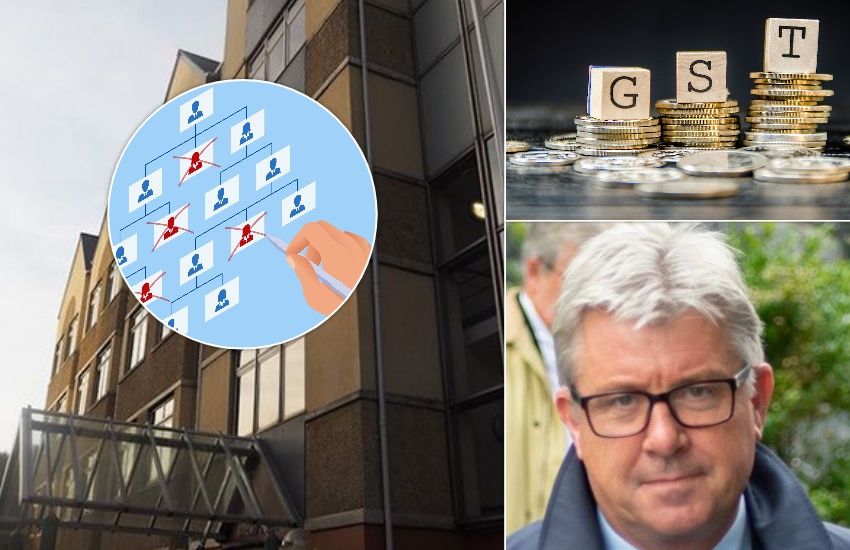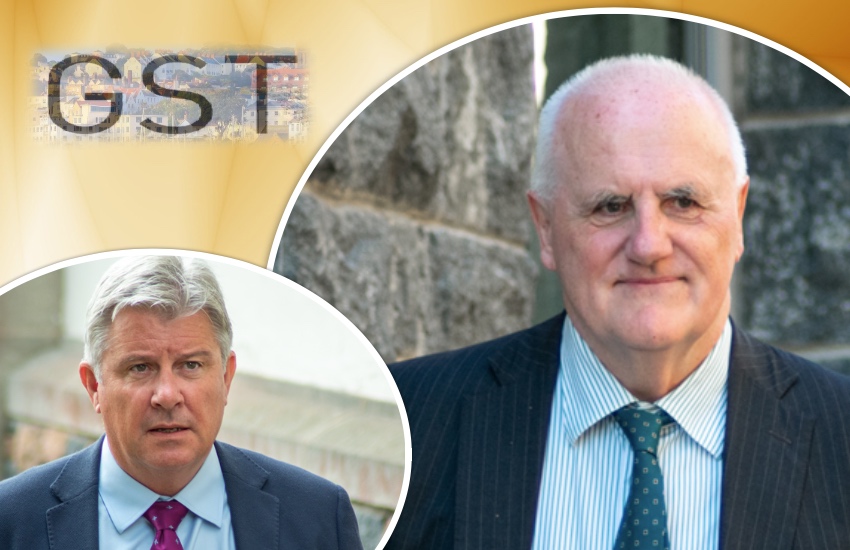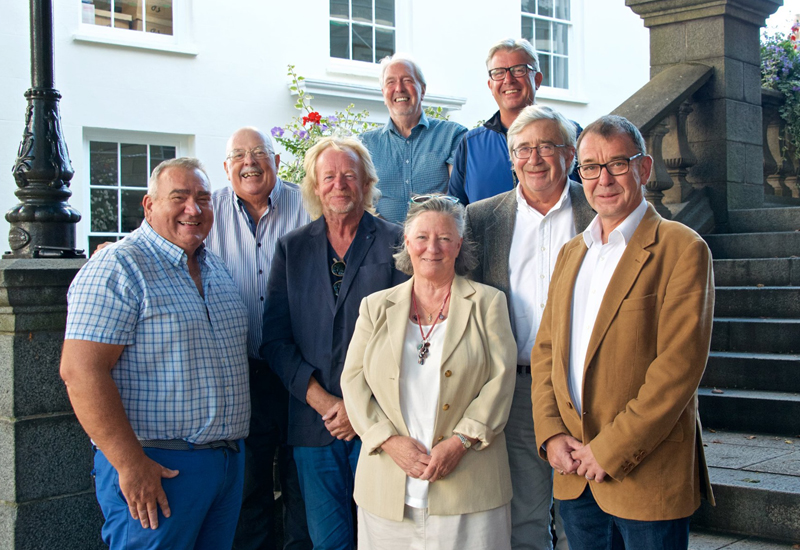


Deputy Mark Helyar successfully led the 2023 Budget through the States’ Assembly with a warning to deputies that they will soon face a clear choice between the biggest tax increases in decades or large job cuts in the public sector.
The Assembly overwhelmingly backed the Policy & Resources Committee’s 2023 Budget. It includes freezing property tax on around three out of four local market homes and pausing the phased withdrawal of tax relief on mortgage interest. It also provides States’ committees with budget increases of £48million to take everyday expenditure next year to £573m, although Deputy Helyar has already said that cost pressures may push up that figure further during the year.
But much of the meeting was overshadowed by speeches previewing a landmark debate set for January at which the Committee is expected to propose the introduction of a goods and services tax [GST] at 5% or 8% or alternatively substantial cuts to States’ spending to deal with a projected medium-term deficit of up to £85million a year.

Pictured: The President of the Policy & Resources Committee, Deputy Peter Ferbrache (right), and the Committee's treasury lead, Deputy Mark Helyar, are widely expected to front another attempt to secure States' backing for GST in proposals due to be published before the end of this month.
“I don’t want to see GST. It wasn’t in my manifesto. I’m entitled to change my mind. It’s as simple as that,” said Deputy Helyar, who is the Committee’s treasury lead.
“There are places we can make cuts…they’re just not nice. We’ve got to the point where we can’t make nice decisions anymore or decisions because they are popular.
“I’ve seen the list [of cuts] and everybody will get to see the list at the end of the month because we will do what we can to publish it as a schedule with the [tax] policy letter. We have to be quite sensitive because some of it involves a lot of people losing their jobs, if I’m honest. A lot of people in the public service losing their jobs.
“Our main outlay in this Budget is staff. If we want to save costs, it’s not toilet rolls, it’s not filling holes in the runway in Alderney, it’s in day to day paying for staff doing things. If we want to make decisions about costs, it’s going to cost people. That’s the main cost we have.
“If there is a keenness to cut, let’s do it and get on with it.” He told deputies on other committees: “You don’t need permission from Policy & Resources to cut costs. To suggest that Policy & Resources is responsible for that is also itself irresponsible.”

Pictured: Deputy Helyar warned that deputies who refuse to support big tax rises in a landmark debate in January may provoke substantial public sector job cuts to allow spending reductions to balance the books.
In his campaign for election as a deputy in 2020, Deputy Helyar said he was “against” GST “as it harms the poorest in society”.
In his election manifesto, Deputy Helyar wrote that “calls for higher taxation…can only drive us towards long term decline”.
“I believe if we start down the path to higher taxation, we will see business opportunity reduce and costs rise in all areas," he said.
"Our young people, wealthy residents and businesses in all sectors will not stay in an island where there is no opportunity. History tells us that in almost every jurisdiction, once a new tax is introduced, it never goes away. Once we put our taxes up, we will have let the genie out of the bottle.”

Pictured: Members of the Guernsey Party before the 2020 general election, at which they pledged to oppose GST and work towards reducing taxation. While steering the 2023 Budget through the States, Deputy Helyar spoke positively about GST, and a few hours later quit as the Guernsey Party's leader in the States.
In his closing speech on the 2023 Budget yesterday, Deputy Helyar told voters who may have backed him for his stance on taxation that he must now do what he believes is best for the island.
“I apologise to people who felt that they voted for me because I was going to do what I was told all the time. That’s not going to happen,” he said.
“I feel I have a public duty to make the right decision and I think we all should feel the same way in the best interests of the island and the Bailiwick as a whole.
“Just to warn people: it all sounds great saying I think we need to save more [but] it's going to be a very difficult choice to make. And I’m not going to apologise to anybody for saying it's going to be difficult. I think I have a responsibility to present it the way it is rather than the way I would like it to be.
“Tax alone isn’t going to do this, growth alone isn’t going to do this, and costs alone aren’t going to do this. Inevitably, like any political compromise, we’re going to end up having a bit of everything. That’s the way I expect this to turn out.”

Pictured: Deputy Helyar appealed for deputies to compromise over tax and spending policies and agree measures in January to address a projected shortfall in States' finances of up to £85m a year.
The Committee is projecting that income will exceed day to day expenditure by £33m next year. However, States' policies assume that there will be investment in infrastructure and one-off replacement projects of around £76m a year. Once this capital spending is taken into account, there is a projected deficit of £43million.
The States have agreed capital spending projects for their current term which total more than £500m. Under present States' policies, the only way of funding those projects is to spend the island's reserves accumulated in previous years.
The Committee secured approval for additional efficiency savings for next year of less than £1m – a third of which relate to ongoing reductions in money paid to the grant-aided colleges, a policy agreed by the previous States.
The former President of the Committee, Deputy Gavin St. Pier, used his speech on the 2023 Budget to accuse the present Committee of being “fiscally incontinent”.
He also criticised deputies who pledged at the 2020 general election to cut States’ spending but were now enthusiastically backing inflation-busting spending increases.

Pictured: Deputy St. Pier labelled the Policy & Resources Committee as "fiscally incontinent".
“The position was extremely well known before the election. Frankly, anyone who truly believed that they didn’t know the position at the time of the 2020 election shouldn’t have stood because they either were dangerously ill-informed or they ignored the evidence to give them space to parrot a lot of populist nonsense,” said Deputy St. Pier.
“We have a budget of nearly £600m and we think we can take only £200,000 out of procurement and with the laser-like focus of Deputy [David] Mahoney on property over the past two years we can only find £200,000 in property rationalisation. It’s a de minimis number, it lacks all aspiration, it’s pathetic. Even a 1% savings target for committees would save £6m a year. I think the absence of any general savings target is unforgivable and frankly irresponsible.
“Deputy Helyar, when he opened debate, talked about us being at a cliff edge. Yet I think this Budget gives every impression that frankly he’s been asleep at the wheel and that we’re heading towards the cliff edge with his foot firmly on the accelerator of spending.
“This is a runaway budget. An extra £48m in spending next year. We’re hurtling towards that cliff edge and this Budget doesn’t do anything to slow the pace of that. It is fiscally incontinent.”
Deputy St. Pier said that proposals in the Budget to assist householders were “derisory” and compared them to Jersey’s recent £50m mini budget to aid people suffering with cost of living pressures.
“In short, there is no fiscal stimulus or relief coming from government in response to the economic crisis. We are giving with one hand and taking it back with the other,” he said.

Pictured: Deputy Mark Helyar spoke of a cliff edge in States' finances, but Deputy Gavin St. Pier said the treasury lead appeared to be accelerating the States' financial car as it approached the cliff edge.
“We’ve heard a lot of vacuous claptrap in this debate about how we must do something different. And this is all the same language we heard on the election trail two years ago,” said Deputy St. Pier. He cited the Assembly’s approach to primary education as an example.
“We know we have excess spaces pretty well amounting to two medium-sized primary schools and the majority of this Assembly decided they didn’t want to support a primary review.
“The Committee for Education, Sport & Culture were quite open about that at the time – that it was too politically uncomfortable, too much else [was] going on and it would almost certainly result in a recommendation to close a primary school.
“So we’re keeping at least one open which is effectively surplus to requirements while we know we’ve got overcrowding in the Town schools and at St Martin’s. We had an opportunity to do something different and we chose to carry on doing the same.”

Pictured: Deputy Gavin St. Pier said that declining to review supply and demand across the island's primary schools was a good example of the current Assembly's reluctance to make difficult decisions despite consistent messages from its members that they wanted to do things differently.
States' spending in 2023 could go above £48m budget increase
States spending set to increase by nearly £50m next year
"We're nearing the day that we will have to turn off services"
P&R tight-lipped on whether tax proposals remain on track
Firm appointed to review whether companies could pay more tax
FOCUS: Opposition across the States to P&R's latest GST plan
EXPLAINED: Why the States' leaders believe GST is needed now
Comments
Comments on this story express the views of the commentator only, not Bailiwick Publishing. We are unable to guarantee the accuracy of any of those comments.